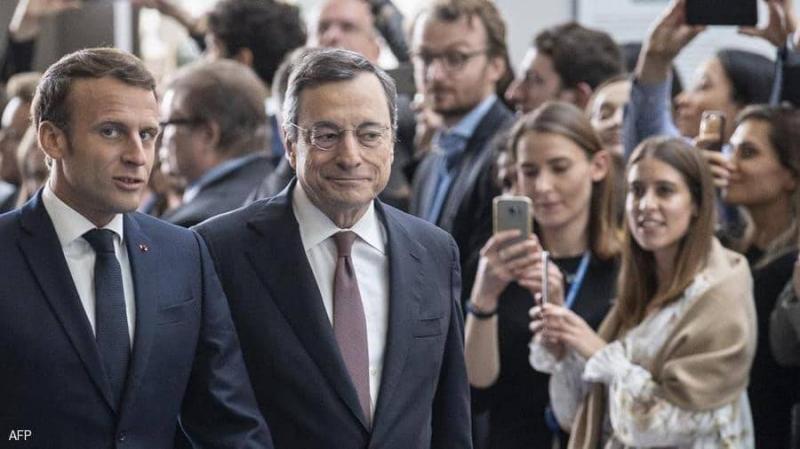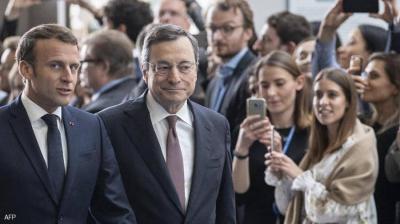French President Emmanuel Macron will arrive in the Italian capital, Rome, on Thursday for an official two-day visit, according to French sources. Italian Prime Minister Mario Draghi is set to receive President Macron upon his arrival, before holding bilateral talks with Italian President Sergio Mattarella on Friday. During the visit, Macron and Draghi will sign a treaty to "align French and Italian positions and coordinate between the two countries on issues of European policy, foreign affairs, security, defense, migration, economic and educational research, cultural cooperation, and cross-border collaboration." The treaty is expected to put an end to years of disagreement between the two European nations regarding Libya and several foreign policy issues.
**Agreement on the Libyan Crisis**
In this context, Mohamed El-Masbahi, Head of the Empowerment Research and Strategic Studies Center in Libya, stated that "it is natural to have a Franco-Italian alliance concerning the Libyan crisis, especially following Turkish calls aiming to disrupt the current situation. Thus, European opinion must unite because the impending danger will affect all EU countries." El-Masbahi confirmed in exclusive statements to Sky News Arabia that EU member states feel a real threat due to the ongoing illegal migration from Libyan territories to their shores. He pointed out that the previous Franco-German-Italian division negatively impacted the Libyan situation, which has become more of an international rather than a local issue.
El-Masbahi also emphasized that the Franco-Italian rapprochement regarding Libya will unify perspectives and work in the same direction led by the Paris Conference to advance the elections and the withdrawal of mercenaries. He underscored the role of the joint military committee which is diligently working to achieve this goal. He noted that the Franco-Italian alliance would contribute to stabilizing the political situation in Libya and spare the country from the ills of European interference and conflict within the Arab region.
**Shifts in International Dynamics**
For his part, Samir Raghbi, Head of the Arab Organization for Development and Strategic Studies, indicated that "the Franco-Italian rapprochement is one of the developments on the Libyan stage, as the international community, except for Turkey, wants elections to happen by any means." Raghbi explained to Sky News Arabia that "the rapprochement comes as a form of dividing the spoils; without stability and elections in Libya, there would be no contracts or investments since the current government cannot implement any new contracts." He added that this rapprochement arises amidst overlapping interests in resolving the Libyan situation, exemplified by the continuation of illegal migration.
Raghbi highlighted that Italy previously opposed the participation of French forces in combating illegal migration and other issues, emphasizing that the conflict between Italy and France is not in either of their interests in light of Turkey's presence. He noted that all current European efforts are aimed at pushing for elections and preventing their obstruction. Thus, he foresees that those obstructing the elections will face a unified European decision, and this will be supported by America, which may impose consequences under the seventh chapter of the UN Charter.
Raghbi also pointed out that this rapprochement will help stop illegal migration, human trafficking, and counter terrorism, in addition to the economic interests that both Italy and France have in Libya, being key players in the oil sector.
**Phases of Franco-Italian Rapprochement**
Regarding the phases of rapprochement between the two parties, the strategic expert indicated that this rapprochement emerged after three phases: the first being confrontation, the second regional competition, and the last being mutual profit. He emphasized that "maintaining the status quo would yield no gains for any of the parties and would increase illegal migration and the crossing of terrorists."
The strategic expert elaborated that "this rapprochement serves the interests of the United States, which currently seeks stability in Libya to reach maximum oil production capacity."
Libyan journalist Ahmed Al-Eisawi mentioned that the treaty aims to close the chapter of constant conflict and would represent a formal diplomatic engagement between the two European states regarding Libya and some foreign issues. He clarified that Italy and France possess a unique perspective distinct from other countries, closely linked to World War II when implementing imperial theory regarding the expansion of their strategic policies to serve their interests. Al-Eisawi concluded that the migration issue in Libya is significant for neighboring countries and the EU, given Libya's critical geographical position.




